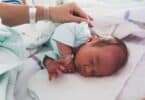
A team of researchers at Yale University studied 1,400 children to see if antibiotic use in infancy had any connection to asthma later on in life. The researchers looked at infants who had been prescribed antibiotic earlier than 6-months, from families that did and did not have a history of asthma in the parents. The researchers found that a single dose of antibiotics increased a child’s risk to 40 percent likely to develop asthma. A second dose raised that risk to 70 percent.
The shockingly high results may be used to convince doctors to find other ways of treating infants. Typically, antibiotics are used in infants to treat infections that can be dangerous to young infants.
“Very early microbial exposure, particularly in the intestinal tract, seems necessary for a mature and balanced immune system in childhood.
“Antibiotic use, especially broad spectrum antibiotics, may alter microbial flora in the gut, thereby causing imbalances in the immune system and a poor allergic response.”
The research leader Dr Kari Risnes said: “The findings from our study should encourage doctors to avoid unnecessary antibiotic use, especially in low-risk children.”
However, not everyone is certain the antibiotics are to blame. Some cynics have argued that the infections themselves could be a cause of asthma, or may be an early symptom of asthma forming.
The Yale researchers, however, say that even infants with no family history and no chest infections showed an increased risk of asthma with antibiotic use. They feel it is the use of the antibiotics themselves that triggers the asthma happening. – Summer, staff writer
Related Articles:
- Breastfeeding Now Has Benefits For Years
- Stress During Pregnancy Increases The Rate of Allergies and Asthma in Babies
- Is Infant Wheezing Preventable By Breastfeeding?






